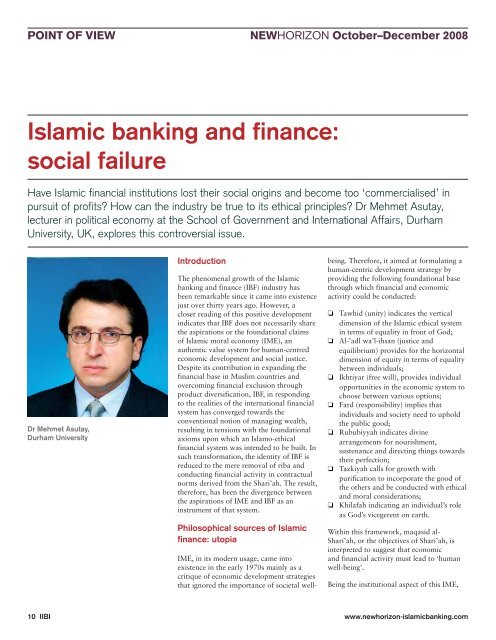azerbaijan: emerging market islamic banking and finance
azerbaijan: emerging market islamic banking and finance
azerbaijan: emerging market islamic banking and finance
You also want an ePaper? Increase the reach of your titles
YUMPU automatically turns print PDFs into web optimized ePapers that Google loves.
POINT OF VIEW<br />
NEWHORIZON October–December 2008<br />
Islamic <strong>banking</strong> <strong>and</strong> <strong>finance</strong>:<br />
social failure<br />
Have Islamic financial institutions lost their social origins <strong>and</strong> become too ‘commercialised’ in<br />
pursuit of profits? How can the industry be true to its ethical principles? Dr Mehmet Asutay,<br />
lecturer in political economy at the School of Government <strong>and</strong> International Affairs, Durham<br />
University, UK, explores this controversial issue.<br />
Dr Mehmet Asutay,<br />
Durham University<br />
Introduction<br />
The phenomenal growth of the Islamic<br />
<strong>banking</strong> <strong>and</strong> <strong>finance</strong> (IBF) industry has<br />
been remarkable since it came into existence<br />
just over thirty years ago. However, a<br />
closer reading of this positive development<br />
indicates that IBF does not necessarily share<br />
the aspirations or the foundational claims<br />
of Islamic moral economy (IME), an<br />
authentic value system for human-centred<br />
economic development <strong>and</strong> social justice.<br />
Despite its contribution in exp<strong>and</strong>ing the<br />
financial base in Muslim countries <strong>and</strong><br />
overcoming financial exclusion through<br />
product diversification, IBF, in responding<br />
to the realities of the international financial<br />
system has converged towards the<br />
conventional notion of managing wealth,<br />
resulting in tensions with the foundational<br />
axioms upon which an Islamo-ethical<br />
financial system was intended to be built. In<br />
such transformation, the identity of IBF is<br />
reduced to the mere removal of riba <strong>and</strong><br />
conducting financial activity in contractual<br />
norms derived from the Shari’ah. The result,<br />
therefore, has been the divergence between<br />
the aspirations of IME <strong>and</strong> IBF as an<br />
instrument of that system.<br />
Philosophical sources of Islamic<br />
<strong>finance</strong>: utopia<br />
IME, in its modern usage, came into<br />
existence in the early 1970s mainly as a<br />
critique of economic development strategies<br />
that ignored the importance of societal well-<br />
being. Therefore, it aimed at formulating a<br />
human-centric development strategy by<br />
providing the following foundational base<br />
through which financial <strong>and</strong> economic<br />
activity could be conducted:<br />
❏ Tawhid (unity) indicates the vertical<br />
dimension of the Islamic ethical system<br />
in terms of equality in front of God;<br />
❏ Al-’adl wa’l-ihsan (justice <strong>and</strong><br />
equilibrium) provides for the horizontal<br />
dimension of equity in terms of equality<br />
between individuals;<br />
❏ Ikhtiyar (free will), provides individual<br />
opportunities in the economic system to<br />
choose between various options;<br />
❏ Fard (responsibility) implies that<br />
individuals <strong>and</strong> society need to uphold<br />
the public good;<br />
❏ Rububiyyah indicates divine<br />
arrangements for nourishment,<br />
sustenance <strong>and</strong> directing things towards<br />
their perfection;<br />
❏ Tazkiyah calls for growth with<br />
purification to incorporate the good of<br />
the others <strong>and</strong> be conducted with ethical<br />
<strong>and</strong> moral considerations;<br />
❏ Khilafah indicating an individual’s role<br />
as God’s vicegerent on earth.<br />
Within this framework, maqasid al-<br />
Shari’ah, or the objectives of Shari’ah, is<br />
interpreted to suggest that economic<br />
<strong>and</strong> financial activity must lead to ‘human<br />
well-being’.<br />
Being the institutional aspect of this IME,<br />
10 IIBI www.newhorizon-<strong>islamic</strong><strong>banking</strong>.com
















